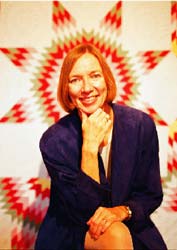 | |
|
Welfare States
THERE'S NOT much alternative about the word "alternative" anymore. But for those practising mainstream medicine, and for Health Canada, the distinction is important. At the moment there's no clear or consistent definition of what constitutes alternative health practices or therapies in Canada. Unfortunately, according to Joan Gilmour, Osgoode Hall law professor and associate director of York's Centre for Health Studies, the definition of alternative is what she calls "residual". "By that we mean traditional medicine is being defined in terms of what it isn't, and that's largely based on what orthodox mainstream practitioners are not doing," says Gilmour. Health Canada recently gave YCHS a $100,000 contract to figure out whether Canadians are enhancing their health or putting themselves at risk when they combine modern medicine with alternative therapies. The federally-funded study also set out to examine what Canadians know about herbs and other "natural" products they take, and make recommendations for further research. Details from the 300-page report can't be released yet, but researchers say it's a beginning in assessing how mainstream medicine may or may not integrate non-traditional practices. "We've just scratched the surface in defining 'alternative'," says Gilmour. "I think research into this becomes almost an ethical imperative. It's a question of which practices and what types of providers we're going to support with our health care system. It's also a matter of consumer use and knowledge. Not so long ago, acupuncture was considered alternative, and now it's much more mainstream. The same thing with midwifery."
Photo:Nadia Molinari |
|
Text Menu [ Home | Past Issues | Subscriptions | Contact Us | Site Map | Search Profiles ] |
